Tom's Guide Verdict
The Corsair HS65 Surround gaming headset provides a pleasant soundscape and a comfortable fit, but PC gamers will get some useful features that console gamers won’t.
Pros
- +
Good sound quality
- +
Comfortable fit
- +
Intriguing SoundID features
- +
Reasonable price
Cons
- -
Mediocre console performance
- -
Not great for everyday music
Why you can trust Tom's Guide
Compatibility: PC, PS4, PS5, Switch (handheld)
Drivers: 50 mm
Frequency Response: 20 Hz – 20 kHz
Wireless: No
Weight: 9.9 ounces
The Corsair HS65 Surround is beautiful in its simplicity. It’s a wired gaming headset that works with both PC and consoles; it costs $80; it has precisely one special feature. It looks pretty good, sounds pretty good and fits pretty well. The mic sounds clear, the volume controls are easy to reach and it’s obscenely easy to connect to your system of choice.
In fact, if you work and play primarily on a PC, the HS65 Surround is one of the best gaming headsets that you can buy in this price range. On the other hand, if you want to play games on a console, or use the HS65 as an everyday headset, it has a few notable drawbacks. The console audio quality isn’t nearly as consistent as on PC, and it’s not a mobile-friendly peripheral.
Still, if you want a no-nonsense gaming headset for $20 less than a product like this would usually cost, the HS65 Surround is well worth a look. Read on for our full Corsair HS65 Surround review.
Corsair HS65 Surround review: Design
The Corsair HS65 Surround looks like many other Corsair headsets, for better or worse. It comes in black or white colorways, with a padded steel headband, oval earcups, a flexible boom mic and a ridged volume dial. One glance, and you'll know that the HS65 Surround is a gaming headset, although not an obnoxiously garish one.
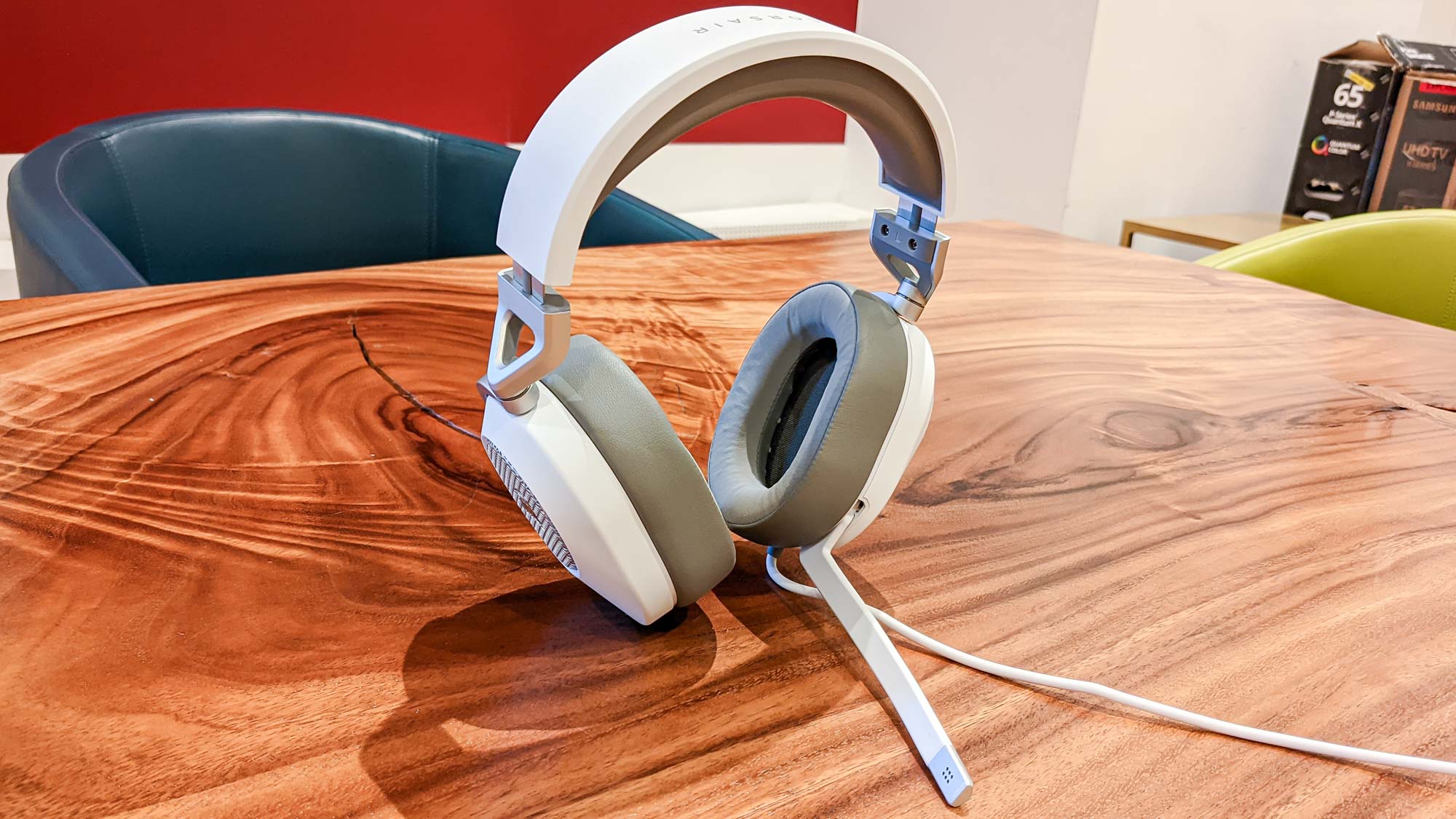
The device connects via either 3.5 mm audio cable or an included USB adapter. Both connections work fine, and the wire is long enough to comfortably reach a desktop or laptop, or a console controller.
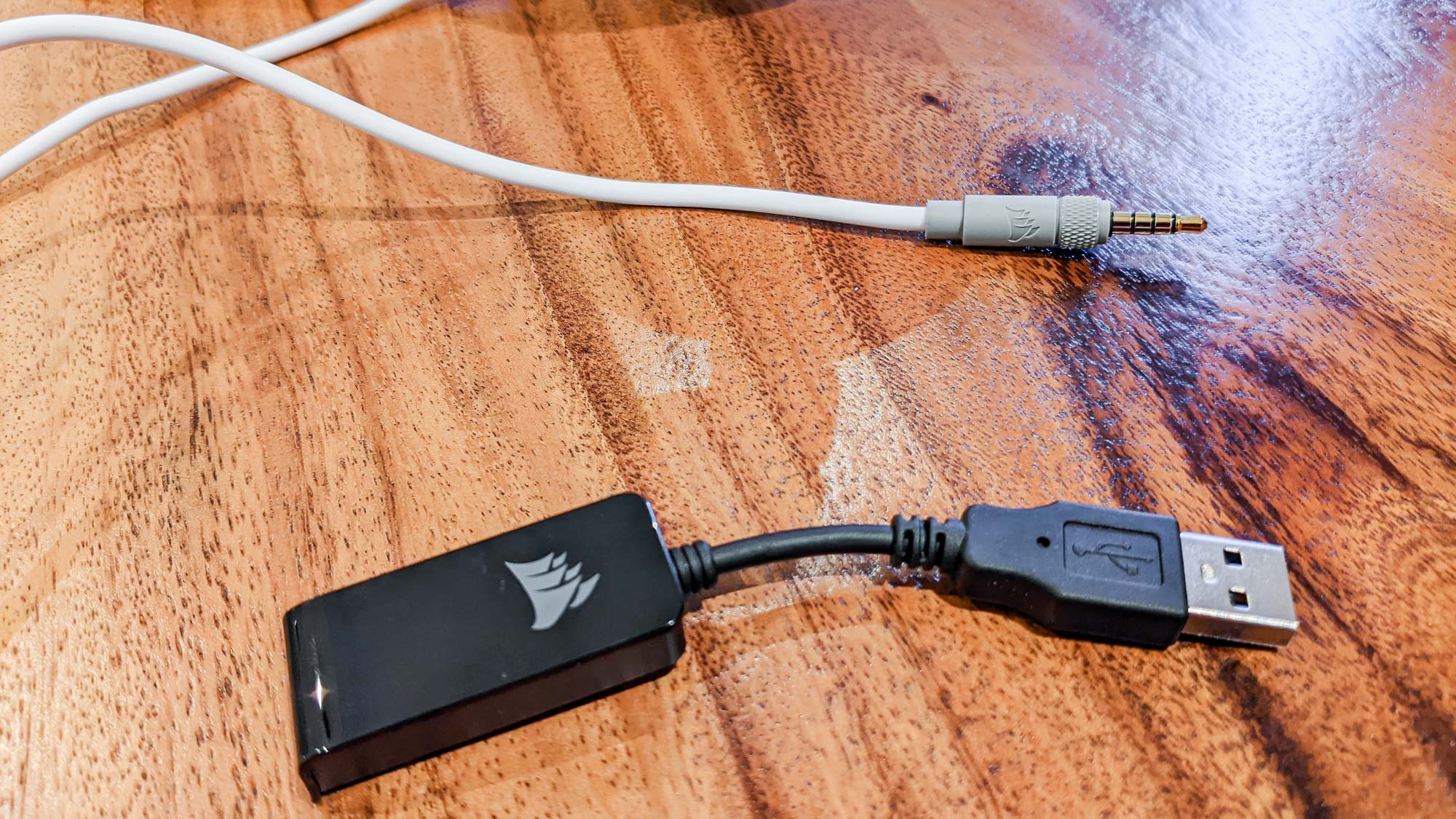
My only real issue here is that the 3.5 mm/USB setup, in conjunction with the nonremovable mic, limits the HS65 Surround's utility as an everyday on-the-go headset. Many mobile devices have foregone the 3.5 mm audio connection altogether, and you can't connect via USB-C or Bluetooth. This is a headset that will have to live near your gaming gear at all times.
Corsair HS65 Surround review: Comfort
While the Corsair HS65 can be a bit snug around the ears. It's not uncomfortable by any stretch. Thanks to plush memory foam earcups, I was able to wear the HS65 Surround for hours on end without any ill effects. However, it's worth noting that the steel headband is not notched, and it's relatively easy to move the sliders up and down. As such, if you find a perfect fit, it's relatively easy to undo it. Furthermore, if you share the headset with housemates, you'll have to readjust it manually each time, with no frame of reference.
Get instant access to breaking news, the hottest reviews, great deals and helpful tips.
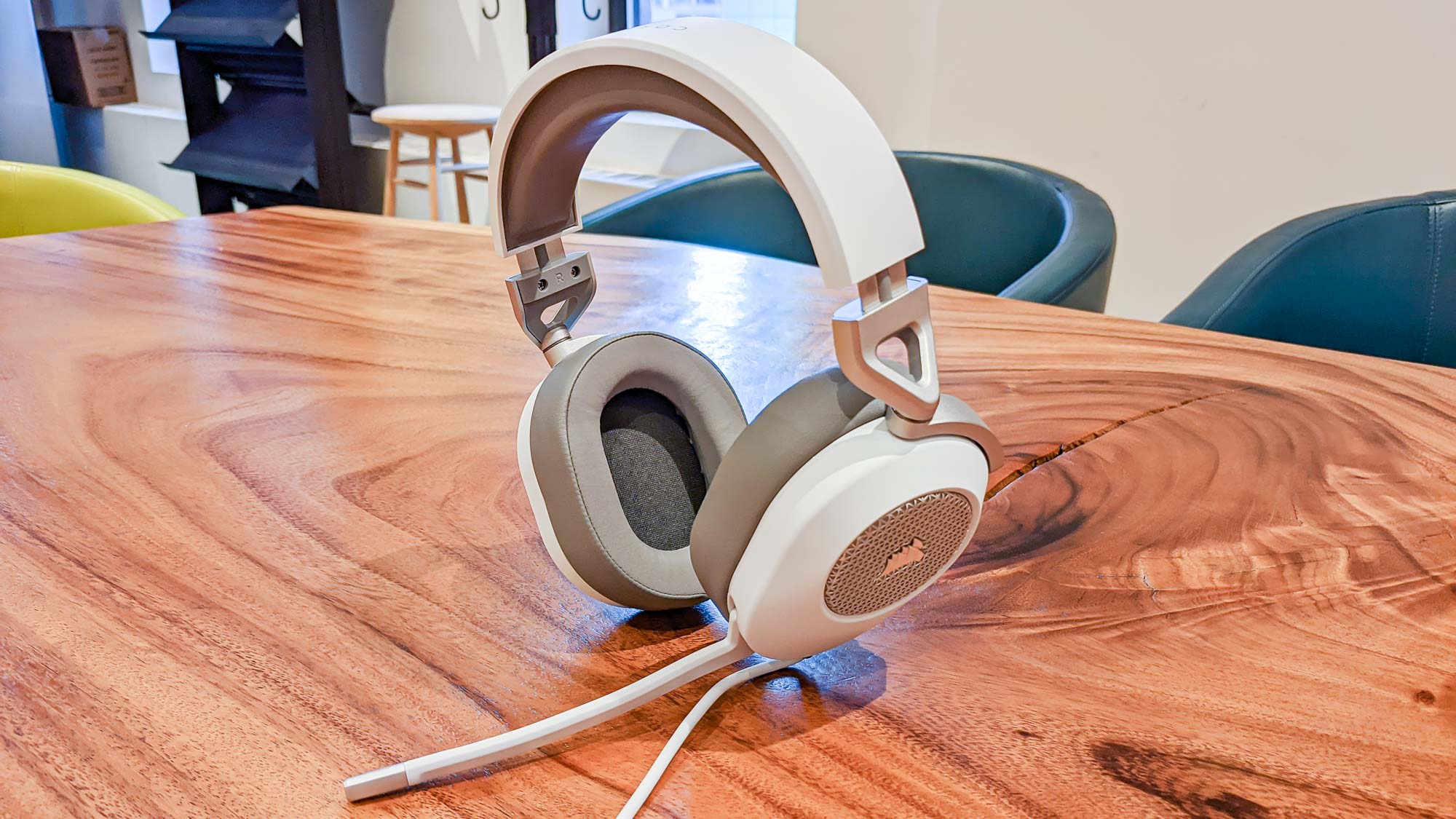
I do have to give Corsairs some credit for its flexible boom mic, however. It's extremely easy to fold the mic up, putting it completely out of a player's peripheral vision. Other headsets often leave the mic in plain sight, and it can be extremely distracting.
Corsair HS65 Surround review: Performance
I tested the Corsair HS65 Surround with Age of Empires IV, Doom Eternal, Cyberpunk 2077 and Final Fantasy XIV on PC. This was an excellent experience all around. With powerful 50 mm drivers and Corsair's novel SoundID technology (more on this in the next section), each game's soundscape felt rich, nuanced, and immediate. The chill music in Age of Empires helped me concentrate on building up my medieval society, while the tense dialogue and subtle sound effects in Cyberpunk 2077 felt almost real. There are higher-end gaming headsets out there, but for a sub-$100 model, the HS65 Surround sounds much better than you might think.
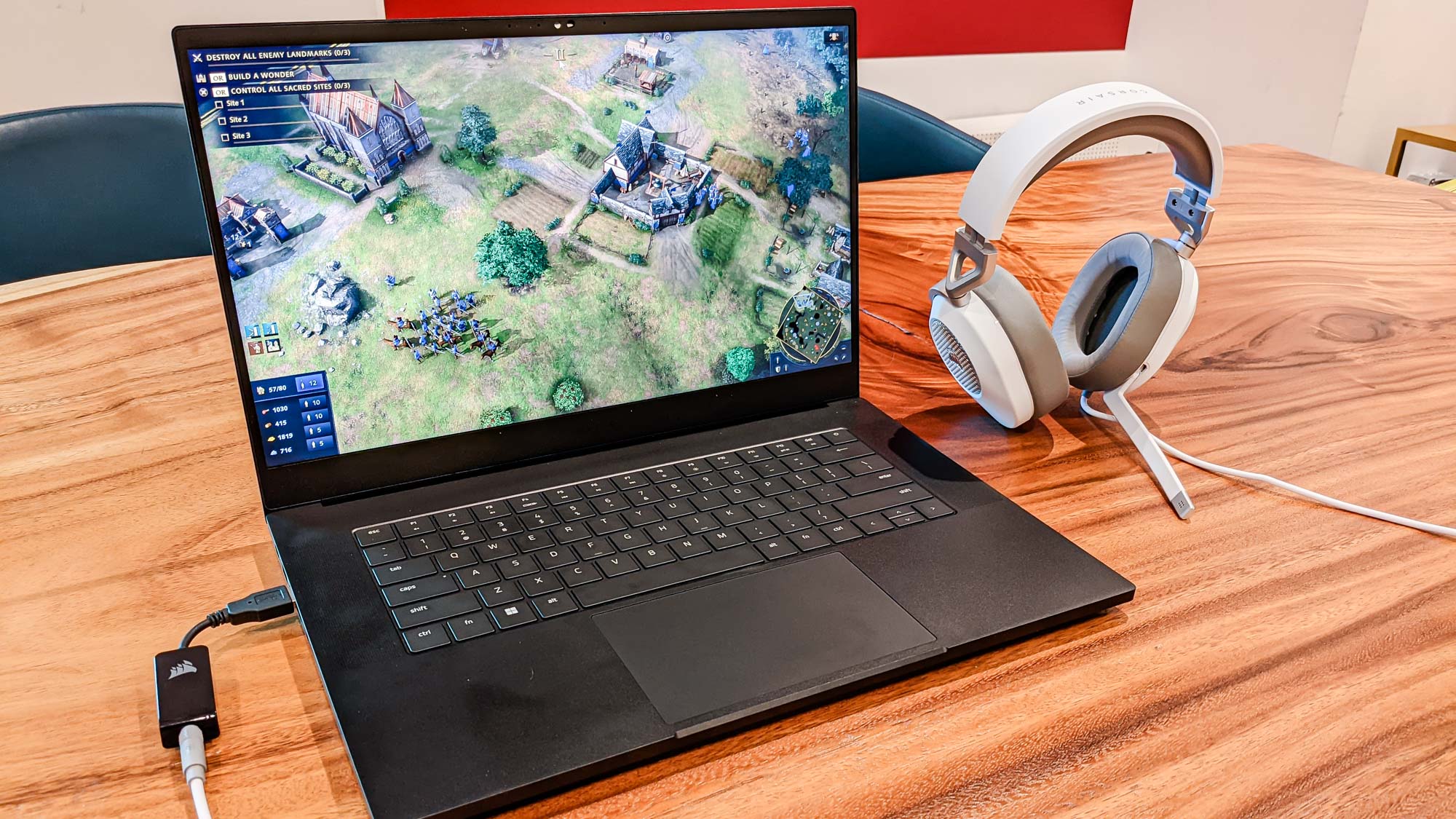
However, when I moved the HS65 over to an Xbox Series X, I realized that the USB connector had been doing a lot of the heavy lifting. Without the Corsair Utility Engine (iCUE) software as an intermediary, the first thing I noticed is that the HS65 Surround has extremely inconsistent volume levels. The Xbox menus sounded almost too quiet to hear, until I turned everything all the way up — and promptly turned it back down as soon as I launched Yakuza 6.
With powerful 50 mm drivers and Corsair's novel SoundID technology, each game's soundscape felt rich, nuanced, and immediate.
Finding the right volume on consoles was a constant issue, whether I was gunning down Locusts in Gears of War, or exploring Grecian labyrinths in Hades. Even then, the sound quality veered toward "fine," lacking the subtleties I'd heard on PC. To be perfectly frank, I wouldn't buy the Corsair HS65 if you plan to use it exclusively as a console headset.
Corsair HS65 Surround review: Features
Hardware-wise, the Corsair HS65 doesn't have anything too exciting. The left earcup has a volume dial, which works as advertised, and a mic, which is a bit clearer and better at screening out background noise than you might expect for the price. That's about it.
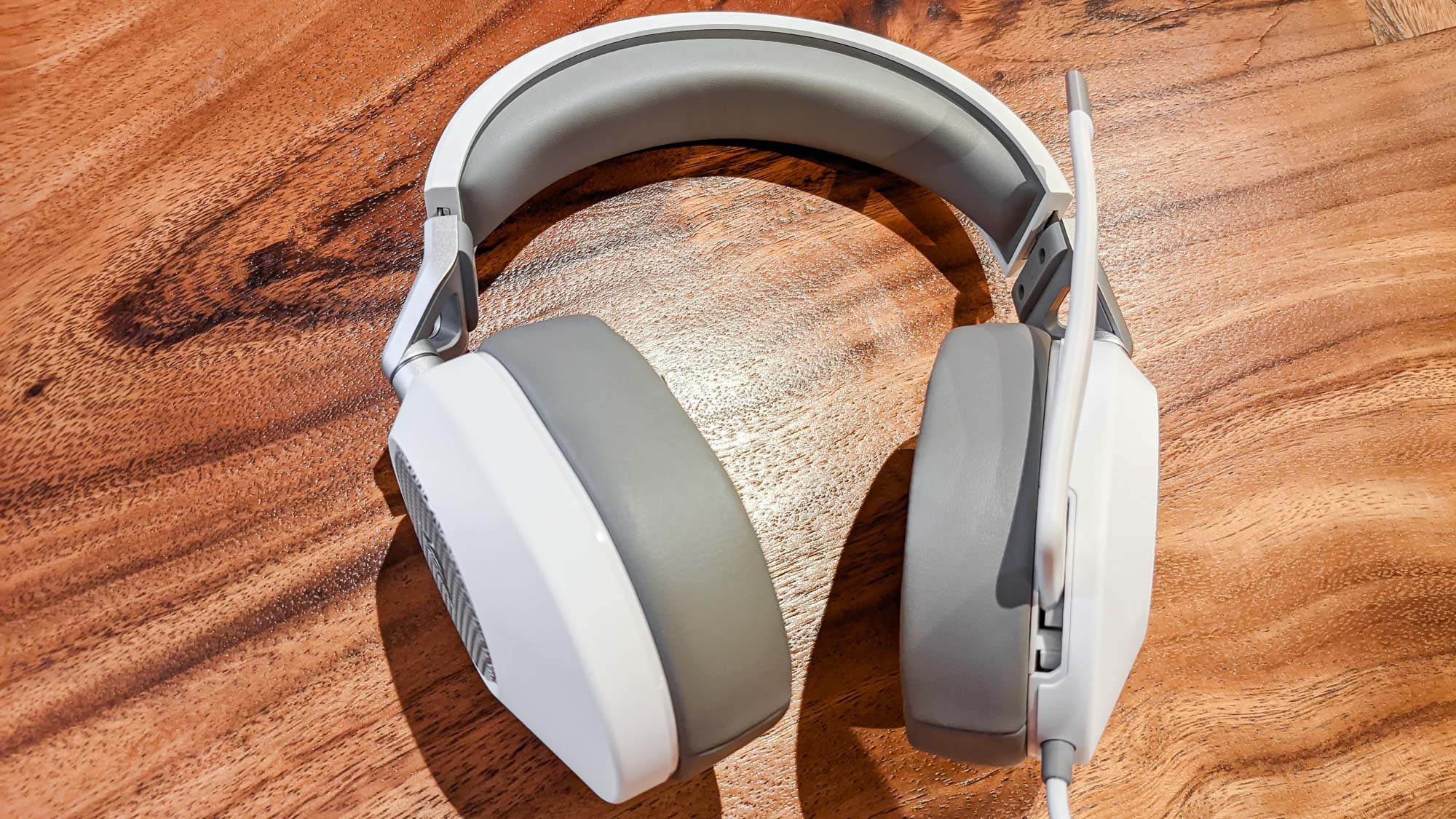
Software-wise, though, you can do some pretty cool things with iCUE. You can fiddle with equalization levels, mic volume, voice prompts and all the standard headphone settings. But what impressed me most was Sonarworks' SoundID technology, which Corsair has licensed for the HS65 Surround.
Here's how it works: iCUE offers you a selection of short, looping songs. You choose your favorite one, then listen to a series of A/B audio prompts. If you've ever had an optometrist ask you which lens looks clearer, it was like that, but for your ears.

You select which one sounds "better" to you, and iCUE will build a personalized sound profile for your ears. It's a way to make your own perfect EQ settings without having to know a thing about EQ. And, in my experience, it wound up being a fantastic option for everything from playing games, to listening to music, to streaming TV shows. SoundID almost singlehandedly elevated the HS65 Surround from a headset that sounds good to a headset that sounds great.
Corsair HS65 Surround review: Verdict
In a way, the Corsair HS65 offers much more than I expected from a $80 headset. The sound quality is excellent on PC, the earcups are comfortable and the microphone is clear.
On the other hand the Corsair HS65 is more or less what I expected from a $80 headset. The compatibility is limited, the console performance is inconsistent and the fit could be better.
Still, on the whole, there's a lot to like about the HS65 Surround, particularly if you take some time to play around with SoundID. If you're only going to play on consoles, you might consider the $50 Razer Kraken X instead. Likewise, if you're just going to play on PC and can spring for the $130 Logitech G Pro X, that one has better sound quality. But if you're looking for something in the middle, the HS65 Surround should be the right product at the right price.

Marshall Honorof was a senior editor for Tom's Guide, overseeing the site's coverage of gaming hardware and software. He comes from a science writing background, having studied paleomammalogy, biological anthropology, and the history of science and technology. After hours, you can find him practicing taekwondo or doing deep dives on classic sci-fi.

